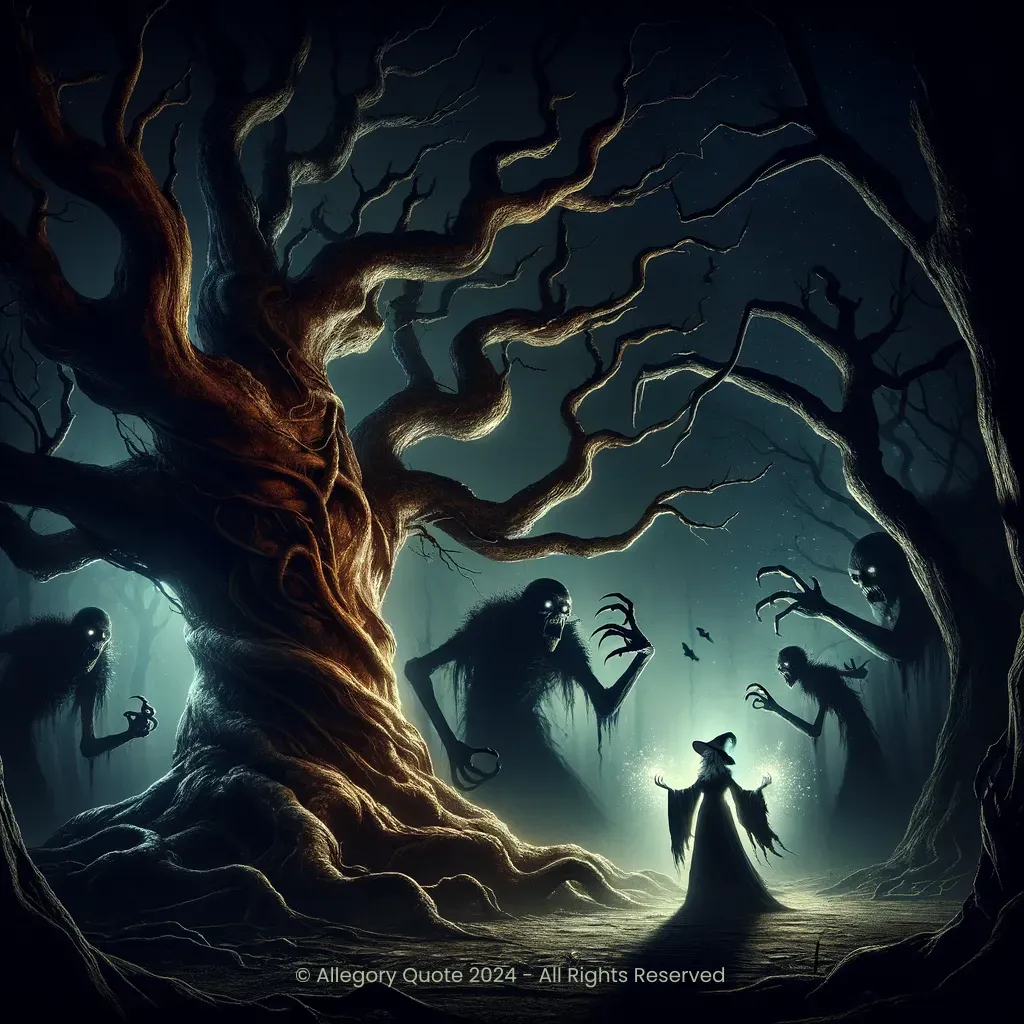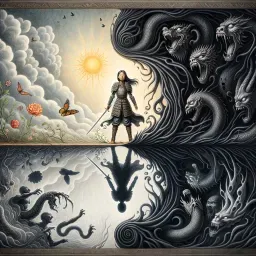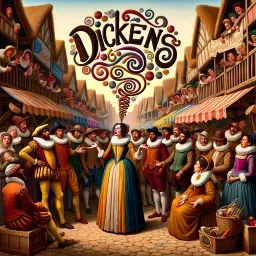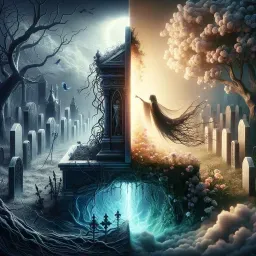”By the pricking of my thumbs,
something wicked this way comes“

- Meaning
- The phrase "By the pricking of my thumbs, something wicked this way comes" suggests an intuitive feeling of foreboding or that a sense of danger is impending. In this context, the witch is hinting at Macbeth's arrival, which the witches see as a wicked event. "Pricking of my thumbs" refers to a tingling or uneasy feeling in the body that some believe signals a nearby evil presence or ill omen.
- Allegory
- The dark and eerie forest with dim moonlight sets an ominous atmosphere, reinforcing the mood of foreboding. The ancient, gnarled tree with human-like features symbolizes nature's response to impending evil, its twisted branches representing the intuitive warning of danger. The witch at the base, with her thumbs pricking and emitting sparks, captures the essence of intuition and supernatural awareness. The shadows forming looming figures in the background add to the tension, suggesting the approach of malevolent forces. This imagery encapsulates the mysterious and uneasy feeling of anticipating something wicked, resonating with the theme of intuition and premonition of danger.
- Applicability
- This phrase can be applied to situations where one has a gut feeling that something bad is about to happen. For example, it can be used to describe that sense of anxiety before encountering a challenging situation or an unpleasant person. It captures the universal experience of intuition warning us about potential danger ahead.
- Impact
- This phrase has had a significant cultural impact, frequently cited in literature, theatre, and popular culture to evoke a sense of impending evil or misfortune. It has inspired titles of various books and films, most notably Ray Bradbury’s novel "Something Wicked This Way Comes." The phrase continues to be used to communicate a sense of growing dread or foreboding in many contexts.
- Historical Context
- "Macbeth" was written around 1606 during the early 17th century. This was a time of political intrigue and social upheaval in England, as well as witch hunts and trials which are reflected in the play. The inclusion of witches and supernatural elements would have resonated with contemporary audiences' fears and beliefs in the occult.
- Criticisms
- Some criticisms of the phrase might center on its reinforcement of the stereotype of witches as malevolent figures, which has historical implications for the persecution of women accused of witchcraft. Additionally, the mention of a physical sensation indicating impending doom can be seen as perpetuating superstitious thinking rather than rational thought.
- Variations
- Variations of this phrase are minimal, but different interpretations can be found in a myriad of cultural adaptations. For instance, in some cultures, physical sensations like tingling are connected to spiritual or supernatural beliefs that differ from Western interpretations of witches and omens.
-

The empty vessel makes the loudest sound.
-

I like this place and could willingly waste my time in it.
-

Battle not with monsters, lest ye become a monster, and if you gaze into the abyss, the abyss gazes also into you.
-

I bear a charmed life.
-

How far that little candle throws his beams! So shines a good deed in a naughty world.
-

There are more things in heaven and earth, Horatio, than are dreamt of in your philosophy.
-

I cannot tell what the dickens his name is.
-

The evil that men do lives after them; the good is oft interred with their bones.
-

One touch of nature makes the whole world kin.
-

They do not love that do not show their love.
-

Come what come may, time and the hour runs through the roughest day.
-

If you can look into the seeds of time, and say which grain will grow and which will not, speak then to me.
No Comments